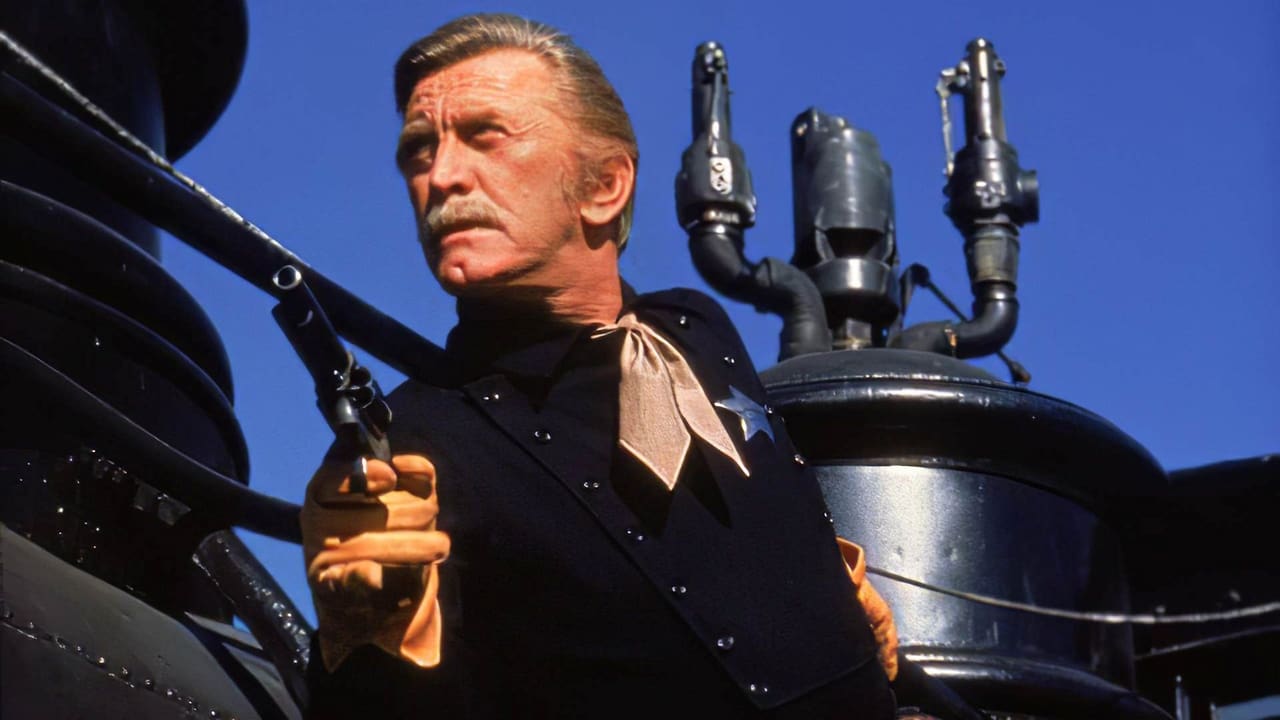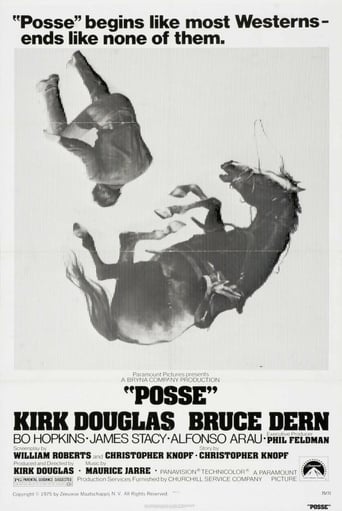BroadcastChic
Excellent, a Must See
Freeman
This film is so real. It treats its characters with so much care and sensitivity.
Jerrie
It's a good bad... and worth a popcorn matinée. While it's easy to lament what could have been...
Yazmin
Close shines in drama with strong language, adult themes.
lost-in-limbo
U.S Marshal Howard Nightingale is a man who has big political aspirations and to achieve this dream. He and his posse of deputies go after an out-law Jack Strawhorn. When Nightingale captures Strawhorn, just like his other captors or conquests he exploits it through the media for public support. Strawhorn would be Nightingale's ticket into the US senate, but Strawhorn thinks otherwise.Can westerns be too low-key? 'Posse' felt so. Kirk Douglas directs and stars in this understated, but thoroughly ambitious under-the-radar western that had something cynical to say when it came to its closing credits. Quite heavy-handed and aware of its messages (money buys loyalty with the guys donning their badges being no better than the outlaws and representing an image (the people's?) to manipulative achieve a politically upper-hand), but the story's format is just so odd and subversive. The western conventions are there, but by the end William Roberts and Christopher Knopf's cleverly sharp (if sly) material basically turned it upside down with an ironic turn of events. It has that fragrance of the pioneer Hollywood westerns, but its punishing violence and sexual inclusions with a quiet, but powerful conclusion roots it in the 70s. The unusual theme to it and the effortlessly collected and cool-witted performances of Kirk Douglas and Bruce Dern (who shared a terrific chemistry) cover for how mechanical the film did look. Nothing totally skillful or stylish about it. Douglas' direction is raggedly rough and a little too plain. However some action shootouts and chase sequences were competently entertaining, but when the violence did hit, it wasn't presented in such a meaningless parade. It went hand-to-hand with the thoughtful nature of the script. Dick O'Neill's taut, but at times flashy photography is fluidly shot and Maurice Jarre's uncanny score is strongly delivered. Supporting Douglas and Dern (who's character's made great for sparing confrontations) is excellent performances by Bo Hopkins, James Stacy, Beth Brickell, Dick O'Neill and Alfonso Arau. A western that's too interesting to pass up because of the calculating tone lurking underneath.
classicsoncall
Finally, after watching literally hundreds of westerns, score one for the bad guy! Bruce Dern's character is Jack Strawhorn, a savvy train robber with enough sense in the early going to know that his gang was second best to Marshal Howard Nightingale's (Kirk Douglas) lawmen. Savvy enough also to allow himself to be captured than to foolishly throw down with Nightingale when he had the upper hand. Strawhorn's capture virtually assures Nightingale of an election win for a U.S. Senate seat, a position he's angling for with a lot more ambition on his mind than simply serving the people.As the story plays out though, things get a whole lot murkier, so much so that the finale winds up totally at odds with any sense of credibility. Granted, Nightingale's men spend a fair amount of time worrying about what will happen to them should he pack up for Washington, D.C. Here's what bothers me though - who's payroll were they actually on to begin with? They were uniformed officers and all wore stars; Nightingale's title was that of a Marshal. So why wouldn't they have remained no worse off than their present circumstances? I can understand them shaking down the town to save the life of their boss, but then to turn around and split up the money just because Strawhorn suggested it just doesn't make sense to me.Other than the ending that proved a letdown for this viewer, the film does have some fine points to offer. The cinematography is more than adequate, and the hijacked train on fire was an exciting touch. There are also two outstanding scenes where horses go above and beyond the call of duty. The first involves a mount going over a cliff and into the water at the Mexican camp, and later when Strawhorn attempts his getaway from the train on horseback. How does one get a horse to take those crazy spills?Pay attention to the scene when Strawhorn plans his breakout on the train. He rigs a garrote from a piece of wire taken apart from a broom and lashes Wesley (Bo Hopkins) tightly by the neck to the bars of the cell. Later when Wesley answers Strawhorn's call to come to his room where Nightingale is kept hostage, there isn't even the slightest hint of redness or abrasion on his neck from the event.One other comment bears mentioning that came across unintentionally funny. The train bearing Nightingale's posse is clearly marked as the Texas and Arizona Rail Road. While stationed at the town of Tesota, three of Nightingale's randy men entertain women folk of the town in secluded quarters. Interestingly, there's a shot of one of the train cars with the abbreviated name - 'T.& A. R.R.' For Wesley and the boys, it certainly was.
bkoganbing
One thing about Kirk Douglas is that he's never been afraid to let the public see him as a bad guy. It's a great tribute to his ability as an actor to develop such a wide range of characters from the heroic Spartacus to the villainous George Brougham in The List of Adrian Messenger.Posse falls somewhere in the middle of those two films in terms of the good versus evil scale for Kirk Douglas. Politicians running on "law and order" platforms were just coming into vogue at the time and this western is spot on about those kind of politicians and the motivations behind them.Kirk Douglas is a U.S. Marshal with political ambitions to be a United States Senator. He's got his photographer with him to record his exploits and travels on a private railroad car provided by the railroad. He's on the trail of outlaw Jack Strawhorn, played by Bruce Dern. Before capturing Strawhorn, Douglas and his posse burn alive Dern's gang in a barn fire and then butcher another group of misfits he's put together even as they want to surrender.What I like most about Posse is that it doesn't try to make Dern out any kind of a hero. He's an outlaw the way some people are grocers, bakers, shoemakers, etc. This may very well have been Bruce Dern's best screen role.It turns out that Dern is a far better judge of human nature than the fatuous Douglas is. The town of Tesota, Texas where most of the action takes place is very much sadder and wiser when the film concludes.A lot of the same themes are covered in the more acclaimed The Unforgiven with Clint Eastwood who also starred and directed himself. But I think Kirk Douglas got there first.
Jonathon Dabell
Kirk Douglas had already directed the somewhat terrible Scalawag in 1973, but that previous flop did not deter him from having a second stab at the directing job a couple of years on. Fortunately, Posse is a much more accomplished film than Scalawag in every way: Douglas's own direction is more assured, the script by Christopher Knopf and William Roberts is very literate and clever, and Fred Koenekamp's cinematography has a good, professional look about it. By 1975, one would have thought that there would be little mileage left in the western genre. It seemed that nothing new could be done, but this one comes up with a fresh twist by having the "hero" gradually revealed as an unlikable and ambitious social climber.Marshal Howard Nightingale (Douglas) publicly announces that he will bring in infamous railroad bandit Jack Strawhorn (Bruce Dern). Although Strawhorn is a criminal of considerable notoriety - and definitely a man who belongs behind bars - Nightingale has an ulterior motive for apprehending his man. For the good Marshal has decided to run for the Texan senate, and believes that if he can nail Strawhorn - painting himself as a hero into the bargain - he will win over plenty of voters. Gradually, more and more people begin to see through Nightingale's selfish and egotistical political plans. His own posse have their doubts about how they will figure in the Marshal's future schemes; a news editor named Hellman (James Stacy) expresses distrust over the Marshal's ludicrously self-important opinion of himself; even Strawhorn eventually realises what his sly adversary is up to. Ultimately, Nightingale loses his posse and his public favour, with a little clever intervention from Strawhorn, and sees his political dreams left in tatters.The critical response to Posse was much more favourable than Douglas's previous directing attempt, and deservedly so. The western action in the film is good, solid stuff, not too violent (as was the trend in '75), but certainly tough enough to satisfy genre addicts. Douglas gives a strong performance as the absurdly self-obsessed marshal, and Dern is even better as the charismatic, even likable, bandit. The subversive nature of the plot (hero gradually turns out to be villain, villain gradually turns out to be hero) is intriguing and fairly fresh, and helps to add interest to the film. While Posse has occasional lulls, and a few noticeably amateurish performances lower down the cast list, it remains a fresh, interesting, and intriguing addition to a virtually exhausted genre.

